


Power: Building it Without Taking it
Essay #6 from the Book We Are Everywhere
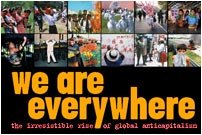
The book We Are Everywhere can be purchased online through the Authentic J-Store at this link. |
By the Notes From Nowhere collective
November 7, 2004
“I want a revolution that changes the very nature of how power is structured and perceived, that challenges all systems of domination and control, that nurtures the empowerment of individuals and the collective power we can wield when we act together in solidarity.”
– Starhawk, US activist and writer
“Meet me by the giant fist!” I can hardly hear my friend’s voice above the roar of the crowd. “Giant fist?” I shout into the cell phone. “Yes,” she laughs, “It’s huge, pink, and made of paper maché. You can’t miss it.” And sure enough, above the sea of heads, I see it: an eight foot-high fist, defiantly erect and utterly ugly, rising above the tens of thousands of people who are here in the main square of Buenos Aires, the Plaza de Mayo. We are celebrating the first anniversary of the day in December 2001 when Argentina’s economic collapse caused a popular uprising in the streets, ousting the government and kick-starting a countrywide rebellion that became a crucible for popular politics.
The fist had been placed there by one of the traditional leftist political parties – political dinosaurs who had attempted to take over the Plaza with a huge stage and long line-up of ranting speakers, calling for a revolutionary workers’ government. It was a desperate attempt to co-opt this genuinely popular movement which was born of disgust with party politics and politicians. Somehow the giant raised fist, so crude and aggressive, said it all. It was so clearly an icon of the politics of the past, something that one might find among the dusty items in the antique shop of failed revolutions, a monolithic symbol of a time when revolution had a simple formula: you built a huge party, waited for the right historical moment, stormed the government buildings, replaced the government, and took power.
The raised, clenched fist is a symbol of people-power worldwide, and yet it is made by a body that is tense, angry, and threatening. It’s a hard, closed, hostile gesture, something that seems alien to what the contemporary spirit of global anticapitalism is about. With a clenched fist you can’t reach out to a stranger, you can’t give or receive gifts, you can’t shake hands. You accept nothing, learn nothing, you can only fight – and the thing for which you fight is power acquired through force. In contrast, perhaps the greatest advantage of our movement of movements is that it struggles to avoid taking power, seeking instead to shatter it into little pieces, to share it amongst ourselves, to open up spaces where everyone can develop the power to create, and to destroy the power that dominates.
“Power poisons the blood and clouds the mind,” said Subcomandante Marcos during the Zapatista caravan that traveled 950 miles from the jungle to the heart of Mexican political power, the central square, or Zócalo in Mexico City in the winter of 2001. Though seven years previously they had declared war on the Mexican state, they were trying neither to secede from nor overthrow it. Instead, they were demanding dignity and autonomy, and developing new ways of seeing revolution. By the time they entered the enormous zócalo, which echoed with the voices of 200,000 supporters chanting “¡No están solos!” (You are not alone!) the Zapatistas had grown into a vast movement with supporters nationally and internationally sharing a contagious idea: that power is about claiming dignity, about taking back control of our communities, and not about holding a seat in government.
Revolutionaries of the past would tell us that a guerrilla force entering a capital city with 200,000 supporters would be in a prime position to spark off an insurrection, occupy parliament, and take power. But the Zapatistas sought none of this. Unarmed, standing on a ramshackle wooden stage with their backs towards the Congress building, they spoke to the crowd in calm, poetic voices: “We are not those who aspire to make themselves powerful and then impose the way and the word. We will never be them… We are not those who wait, naively, for justice to come from above, when it only comes from below…liberty which can only be achieved with everyone…democracy which supports all of us and is fought for all the time….”
The desire to conquer the state maintains the illusion that the state is the foundation of sovereignty and autonomy. But in the networked world of global capital, the state is merely a node in a web of power, woven between the banks, stock exchanges, corporate headquarters, and multilateral institutions. Any government that steps out of line encounters punishment in the form of trade sanctions, capital flight, or military intervention.
Yet the world must be changed. This we know and desire more and more urgently as we witness the destruction and despair brought by capitalism engulfing every corner of our lives. We are in desperate need of another politics. But it is no longer the politics of the clenched fist, the punch of power. Ours is the politics of interlaced fingers, a politics that develops when the “I” and the “you” come together as “we,” when people clasp their hands, warm palms touching, fingers woven together, and build a rebellion that deeply interconnects us, a rebellion of relationships which embraces differences, a rebellion that desires to share rather than to take power.
Fragmenting Power
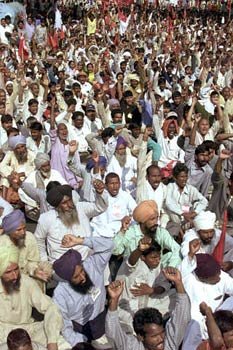 500,000 people take to the streets of New Delhi in 2001 as part of a global day of action against the WTO meeting in Qatar, while across India, farmers force their way into grain warehouses and distribute the surplus grain to the poor. Photographer unknown |
– Gustav Landauer, early twentieth-century revolutionary theorist
What is power? The dictionary tells us that power is “the ability to do or act.” In French and Spanish the word power is the same as the verb “to be able” – pouvoir, poder. It shares its etymological root with the words potent and potential. Put simply, power is our ability to do things, to change things. It is the creative force behind all our experience. It is what makes something possible. It’s easy to imagine power as something that is outside of us, that is safely guarded and exercised by “the powerful,” a tool wielded by the other, the patriarchs, the capitalists, the oppressors. But power does not just reside in one place. It’s not just found in the seat of government, on the screens of the stock exchanges, at the end of the swinging club of the police officer. These are simply places and moments where power has accumulated and become fixed.
All of us use power everyday. We use it when we speak, we use it when we relate to our loved ones, when we play with our children, when we cook a meal, when we write. Power is not a tool. It’s not a thing that one person or a group can wield in isolation; it’s a process that is deeply embedded in a complex set of social relationships.
We cannot exercise power without affecting others. It’s something that flows between us and all of us are embedded in its diffuse and complex web. We cannot escape it, but we can learn to recognize different forms of power, where they come from, and how they can be transformed and allowed to flow unheeded, without accumulating, without becoming fixed in one place.
We live in a society where one type of power is dominant. This is “power over” – coercive power, the opposite of “power to,” which is creative power. “Power over” is someone controlling something outside of themselves: the power of the police officer who prevents you from squatting a building to set up a shelter for the homeless, the power of the corporate executive who slashes their workforce to increase profits for shareholders. It’s the power of the abusive husband who strikes his wife, the power of the international bankers whose actions destabilize national economies disrupting the lives of millions; it’s the power of the revolutionary central committee that leads the revolution. “Power over” tends to be wielded from a distance, physical as well as emotional; it relies on separation, on objectifying, devaluing, dehumanizing. It is the power at the core of capital, the power that takes away our ability to do, separates us from our own land, our own time, our own creativity. It is the power that attempts to disrupt our ability to self-organize, to determine what we wish to do; it is the power that demands that we be indebted to a distant owner, dependent on remote experts, no longer in control of our own lives.
“Power to,” however, is power that affects something in our own lives, close to us, within reach. It is not power that demands others do things for us, but power which enables our own doing. It is empowerment, power that flows without restriction, builds relationships, opens up spaces for possibility, enables others to develop their own “power to.” It is the power to create that radiates from direct democracy and direct action, the productive power that flows between the groups and individuals that make up the network of movements of movements.
Bring power closer to home, reduce the distance between decision-making and those the decisions affect – this is the demand that resonates from the valleys of Narmada to the plains of Ecuador, from the squatted European social centers to the spokescouncils of Seattle, from the township meetings in Durban to the neighborhood assemblies of Buenos Aires. The movement of movements demands power that is not on paper, that is not abstract nor far away, but exercised in our streets, our land, and our lives.
Perhaps the best way to imagine power, in all its forms, is to think of it like water: when it is allowed to flow between us it is “power to,” the power that nurtures, the fertile flow that makes possible. When it freezes or stagnates in one place – in leaders, governments, distant institutions, vanguards, and committees – it becomes “power over”: the power that prevents our ability to refuse what is and decays our ability to create what could be.
From a Mountaintop to the Streets
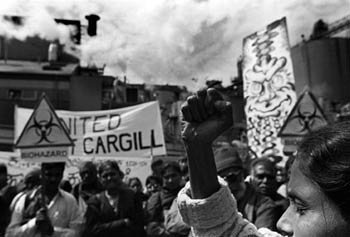 The InterContinental Caravan brings 450 farmers and grassroots organizers from across the global South to the doorstep of agribusiness giant Cargill. Photo: Thomas Schlijper |
– London Reclaim the Streets leaflet, 1997
Billionaire Klaus Schwab, founder and president of the World Economic Forum (WEF) disagrees: “The hard work of improving the state of the world will not be done in the streets,” he declared in 2001 in response to the anticapitalist protesters outside. For Schwab, the correct place for such work to be done is in a luxury retreat from that world, on a mountaintop in Switzerland in the five-star ski resort of Davos, where every year 2,000 “global leaders” gather for the WEF. Described by one observer as: “A spectacle of fur coats tottering on high heels, watched over by marksmen on the roof,” the WEF’s self-proclaimed role is to “mold solutions” and “shape the global agenda.” Billed as the “leading interface for global business and government interaction,” this extraordinary mingling of the elite aims to create “opportunities for the formation of global partnerships and alliances.” Everyone attending must be personally invited by Schwab, who first started to assemble people in 1971 “in a unique club atmosphere” to discuss how to renovate a commercial world he saw slipping into a socialist mire. Ever since then, this exclusive self-appointed think tank has met annually and has been at the forefront of developing the neoliberal agenda.
Mountains have always been the abode of the gods, the places from which the Ten Commandments descended, places of aloof power and immutability. And so it is at Davos: the masters of the universe are all here. Rubbing shoulders in the restaurant during the 2003 meeting were Microsoft’s Bill Gates, the Secretary General of NATO, the head of the Organization for Economic Co-operation and Development, the head of Interpol, and US Secretary of State Colin Powell. The chief executives of Nestlé, British Petroleum, Sony, Novartis, and Goldman Sachs frolicked on the ski slope with the Prime Ministers of Malaysia and Peru. All were being slapped on the back by the editors in chief of Reuters, CNBC, and the Wall Street Journal.
This exclusive mountaintop club for the architects of global capitalism is protected from uninvited protesters by razor wire, riot police, and soldiers in a security operation that now costs the Swiss state more money than any operation since the Second World War. It embodies the ultimate form of detached power – an unelected elite governing from afar, accountable to no-one but themselves. They also represent a globalized form of power that is difficult to resist – an imperial, flexible, nomadic, and diffuse power, much like the supple transnational capitalism that they seek to promote. Most of the select few who attend the WEF are not bound to particular places or nation-states, and the membership changes when necessary: the CEOs of Enron and WorldCom, for example, were conspicuously absent from the list of invitees in 2003. In its own words, the WEF is “tied to no political, partisan, or national interest.” It is the savvy mutable capitalism of the off-shore bank account, the speedy money markets, the flexible production systems, and the lean-and-mean corporation. It is capitalism without a center. Power without a palace. Empire without a Rome.
But all gods have a secret vulnerability: they cease to exist when people no longer believe in them. Trust is the fuel of power. As corporate collapses and financial scandals rock the markets, and the democratic deficit expands as people desert the charade of participation by voting, trust is in short supply. And failure of belief in a system spreads fast. A contagious whisper, it ripples through the multitude, rising to a roar.
The roar was responded to by the World Economic Forum in 2003, when it chose “Rebuilding Trust” as the theme for the gathering. As preparation for the meeting it commissioned a massive public opinion survey representing the views of 1.4 billion people spanning every continent. The results, according to the WEF, revealed “that trust in many key institutions has fallen to critical proportions.” The least-trusted of the 17 institutions in the survey were national governments and corporations. Two-thirds of those surveyed worldwide disagreed that their country is “governed by the will of the people” and half distrusted the WTO and the IMF to operate in the best interest of society. The crisis of legitimacy has hit uncontainable proportions. According to a leaked email from a writer invited to Davos in 2003, the fear amongst the guests was palpable. “These people are freaked out,” she wrote, describing her dinner conversations with the elite. Despite their privilege and wealth, they know that their legitimacy is waning, that we have seen through them, that when trust has been eroded it becomes increasingly difficult to wield power.
Refusing to Cooperate
 The Soweto Electricity Crisis Committee illegally reconnects power for people cut off for non-payment in Wentworth, South Africa. Photo: Justin Rowe |
– Alex Begg, Empowering the Earth: Strategies for Social Change, Green Books
We are led to believe that the system of power is like a pyramid, similar to a food chain with the dominant species at the top maintaining its control over those at the bottom through superior strength and violence. But if an avalanche swept away all at Davos tomorrow, not much would really change because the power the Davos class accrues, through their ownership of capital, extends everywhere.
There is a secret, however, that those on the mountaintop rarely reveal, which is that their power exists to some extent because we allow it to. They want us to believe that they wield power over us with their weapons and armies and police forces, and although their violence is highly effective in disrupting our movements, hurting our bodies and making us afraid, violence alone can’t guarantee their continued existence. Ultimately, it depends upon us believing in their power, in their immutability, and failing to recognize our own. This was the substance of Shelley’s furious ballad of 1819 when he wrote the famous lines to Manchester’s working poor after troops fired on them in the Peterloo massacre: “Rise, like lions after slumber / In unvanquishable number/ Shake your chains to earth like dew / Which in sleep had fall’n on you! / Ye are many, and they are few.”
In reality, the system is more like a huge wedding cake than a pyramid: multiple layers of dominance held up by many pillars – pillars which are institutions and individuals, values and belief systems. Successful movement strategies, therefore, are those that identify the key pillars in society, and work to weaken their compliance until they break. As we take away one pillar, others begin to wobble and the system trembles.
When people in South African townships fight the privatization of services by illegally reconnecting their water and electricity; when Scottish conductors refuse to operate trains transporting weapons; when the Italian Disobbedienti take apart a detention center for asylum-seekers; when hacktivists break into the CIA website and rename it Central Stupidity Agency, they are knocking away pillars. With their disobedience they remove the false aura of legitimacy around the powerful, regain their own dignity, and discover the sheer potency of their “power to.”
“We renounce power,” says activist Raúl Gatica, from the Mexican Indigenous People’s Council of Oaxaca, “and build in the immediate now a different way of being.” Keeping the balance between resistance and reconstruction, between saying no to “power over” and building our collective “power to” at the same time, is key to the success of our movements. In other words, we say no by constructing our yeses.
We need to construct alternative institutions, cultural and economic projects based on co-operative and collective models while simultaneously confronting the oppression of the system. This idea, sometimes referred to as dual power, is key to our success. We must confront and create together.
When those resisting on the streets are also involved in the creative acts of building new ways of living, we reduce the danger that our radical political analysis might become disconnected from the everyday needs of ordinary people. When those working to develop alternatives participate in moments of confrontation and conflict, they are reminded of the system of oppression, they reaffirm their identity as different, and they remember what it is they don’t want to build.
Confrontation and Construction – Argentina’s Piqueteros
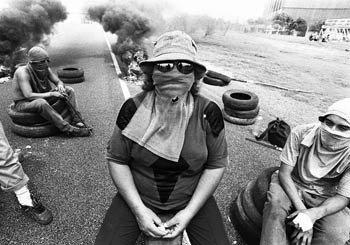 A piquetera blockades the road outside of Buenos Aires. Photo: Andrew Stern |
– Nekka, piquetera from Solano unemployed workers movement, Argentina
But how do these ideas of power work out in the “real world” context of a serious social crisis? An inspiring example of resisting power from above while constructing alternatives through building power from below, is emerging from Argentina.
The recent economic catastrophe there has become one of the most gaping wounds in capitalism’s global crisis, while simultaneously becoming a laboratory for new forms of popular power. Once the star pupil of the “Washington Consensus,” several decades of neoliberal onslaught have hollowed out the Argentinean economy. Foreign capital flowed in during the mid 1990s, seeking quick profits. Everything was privatized, from the post office to the zoo. When the crisis in the Asian markets hit in 1998, foreign capital turned on its heels and fled South America, fearing a contagion there too. Investment dried up, jobs disappeared, poverty mushroomed, and the growing external debt became unpayable. Argentina’s wealthy citizens moved $140 billion – more than the country’s Gross Domestic Product and foreign debt combined – into foreign bank accounts and the IMF clamored for debt payment.
In December 2001, fearing a further run on the banks which would sink the economy, the government announced limits on the money Argentineans could withdraw from their accounts. The middle class was furious. The IMF refused to lend any more money and within weeks Argentina defaulted on its loans, the first time this had happened to a country in years. From this moment, the economy was in free fall. On December 13 a general strike brought the country to a grinding halt. Then six days later, when the poor began to loot supermarkets for food, the government imposed a state of emergency, constitutional rights were disbanded and meetings of more than three people banned. Before the President’s televised announcement of the state of emergency was even over, people were in the streets disobeying it. Over a million people took part, all demanding an end to neoliberal policies and the corrupt government. On December 20 the President resigned, and Argentina was set on a major high-speed collision course with the needs and desires of its people on one side and the demands of the IMF, the inept government, and global capitalism on the other.
This collision manifested itself in the most remarkable of ways. For the crippling tragedy befalling Argentina was being transformed by its suffering population into an extraordinary laboratory for creating alternative economic models and for reinventing political power from below. Thousands of workers occupying and running their factories, neighborhood assemblies practicing street-level direct-democracy, and the radical unemployed movements setting up road blockades and pickets – hence their name piqueteros – all began experimenting with new ways of exercising power.
The piqueteros, for example, are the living embodiment of the idea of building power from below. They were an early manifestation of the rebellion, active from the mid-1990s onwards with their road blockades, during which families demand unemployment subsidies, food, and jobs. The Argentinean media’s image of the piqueteros has been one of masked youths blocking roads with burning tires. But by concentrating on the confrontational tactics, the media has ignored the constructive aspects of the movement, such as bakeries, communal kitchens, and popular education schemes – for the smell of tear gas makes better headlines than that of baking bread.
Carlos, an unemployed telephone technician in his 50s, is part of one of the most radical branches of the piqueteros, the MTD (Movement of Unemployed Workers). His group is transforming a huge, abandoned electronics factory into a self-managed organic farm, clinic, and media center. He said that his most profound political moment since the December 2001 uprising was seeing three young piqueteros faint from hunger. “Our main aim now is to have enough bread for each other,” he said. “After that, we can concentrate on other things.”
The piqueteros’ daily work is creating what they call the “solidarity economy,” an autonomous, non-profit economic system based on need. During the blockades, they demand a specific number of unemployment subsidies, and usually squeeze them out of the local government, despite the pressure of the IMF to cut social spending. The subsidies are then shared and used to fund community projects. Most piquetero groups don’t delegate leaders to meet officials, but instead demand that the officials come to the blockades so that everyone can collectively decide whether to accept any offers – they have too often seen leaders and delegates bought off, corrupted, killed, or otherwise tainted by power.
Maxi, one of the founders of the Almiralte Brown MTD, took me on a tour around his neighborhood. He listed the range of activities they had organized. “We have a group building sewage systems, and another that helps people who only have tin roofs put proper roofs on their houses. There is a press group that produces our newsletter and makes links with the outside media. We have the Copa de Leche, which provides a glass of milk to children and a free meal every day. We have a store that distributes second-hand clothes, two new bakeries, vegetable plots, and a library.”
That afternoon, we visited one of the two weekly assemblies that were happening simultaneously in Almiralte Brown. A group of 70 people stood in a circle. They discussed plans for demonstrations, the problems of the past week, how to get children’s shoes, and how to resolve conflicts between group members. It was mostly women who spoke. One of them named Yolanda told me later how women are hit hardest by unemployment: when there is no food on the table, no clothes for the children, it is women who are at the sharp end of poverty. Often the men feel rejected and paralyzed by the loss of identity that follows unemployment, and it is the women who are first to take part in roadblocks. “Women’s struggle is the pillar of the movement,” Yolanda explained.
The story of Ariel, whose mother joined the movement before him, seemed typical. He had a job selling loans for new cars and every time he saw his elderly mother on TV, masked up and blocking the highways, he would cringe with embarrassment. But no one buys cars now. His job disappeared, and feeding his three children was becoming difficult. So one day he went to the piquetero assembly out of curiosity, and he saw how women, many of them elderly, many of whom had never had the chance to make decisions or express important things about their lives, were able to put up their hands and talk freely and people listened to them. They proposed good ideas and then went and blocked the roads. Ariel soon realized that he too had to join the movement.
When I asked what had changed in their lives since they became involved in the piquetero movement, they told me that the loneliness and isolation of unemployment and poverty had disappeared. Marta, a punky 21 year-old in charge of the piqueteros’ security, said: “The biggest change was the relationship with other people in the neighborhood, the development of friendships, and the possibility of sharing. When you’re on a roadblock and you have nothing to eat, the people next to you share their food. Now I feel I’m living in a large family – my neighbors are my family.”
After the assembly, Maxi showed me the Copa de Leche, housed in an abandoned municipal building next to a plot of land. The piqueteros had taken down the fences and used them to build the base of a huge, roaring outdoor oven on the edge of a football pitch surrounded by newly-dug vegetable plots. Fences torn down and turned into something practical struck me as a beautiful metaphor for the transformation of the private spaces of profit into shared tools of social change – a transformation that involves people building the life they want and defending it, rather than simply protesting against what they don’t want. The piqueteros know you can gain little or nothing by winning power. They don’t want to take over the crumbling center; they want to reclaim the edges, bring back into their community a life that’s worth living. “We are building power, not taking it,” is how Maxi described it.
The Power of the Neighborhoods
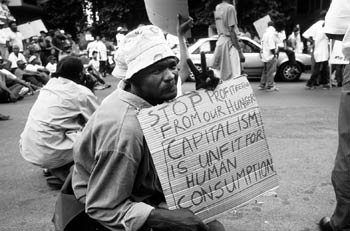 An action to prevent forcible evictions in Johannesburg, South Africa is defying the neoliberal logic of economic apartheid. Photo: Justin Rowe |
– Roli, an accountant and participant in the Almagro neighborhood assembly
Pablo, an unemployed sociologist in his 60s, and an active member of his local assembly describes the night of the uprising of December 19, 2001, saying that there were no political party banners, no placards or flags, just a multitude banging pots and pans – the cacerolazo. “Finally the noise became words and those words were ‘que se vayan todos,’” (out with them all) sung to a catchy tune by a chorus of hundreds of thousands. Now it has become the defining slogan uniting all the movements in Argentina. To many, it was a demand that the entire political class should go, every politician from every party, the Supreme Court, the IMF, the transnational corporations, the banks – everyone – so that the people could decide the fate of the economically crippled country themselves. To others it was simply a demand to bring in a new set of politicians, without corruption and free from the leashes of the IMF. And although it is clearly not a proposal for a new way of running society, the impossibility of the demand cleared the decks of old words and old ways of thinking about politics. Like the many bare, unrented billboards in this city, somewhat beautiful in their enormous emptiness, freed from the images of commerce and consumption, que se vayan todos opened up space. Like a blank page waiting to be filled, it seemed to make anything possible. And in that space, people began talking to each other in the streets, in the silences between the crashing pots and pans, and a new political form emerged: the local neighborhood assembly.
The local assemblies meet weekly, and are open to anyone, so long as they don’t represent a political party. The first one we attended involved some 40 people: a breast feeding mother, a lawyer, a hippie in batik flares, a taxi driver, a nursing student… a slice of Argentinean society standing on a street corner, passing around a megaphone, and discussing how to take back control of their lives. It seemed so normal, yet this was perhaps the most extraordinary radical political event we’d ever witnessed: neighbors discussing self-management, understanding direct democracy and putting it into practice.
Despite the rising poverty, destitution, and despair, self-managed neighborhood assembly projects have popped up across the city. In one of several occupied banks, asamblistas cook meals for 150 people every weekend, and on the top floor, independent media activists update their website. Assemblies plant organic vegetable gardens in vacant lots while a self-managed clinic for workers in the occupied factories is being set up. The assemblies have also become a on-call citizens’ force against police repression. Every time an occupied factory is threatened with eviction, the asambleas mobilize and in several cases have managed to resist the attempts by police to reclaim the factories for the owners.
Hope Is a Verb
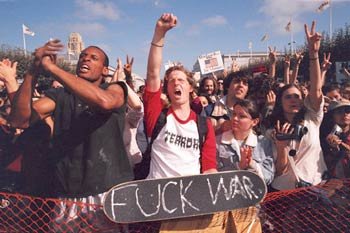 People in San Francisco take to the streets, block freeways, and smash up the INS offices, joining with 11 million worldwide on the same day to demand that a war not be launched in Iraq. Photo: Peter Maiden / San Francisco Indymedia |
And whether you talk to a middle-class member of an assembly or an unemployed piquetero, there is a common understanding that you can’t change society overnight. They understand that change is a step-by-step process of talking and listening, of dreaming and constructing alternatives that are rooted in relationships and neighborhoods, and that each neighborhood, each participant, each place must be profoundly interconnected and mutually supported.
“We can’t do it on our own, and we shouldn’t do it on our own,” says Fabián, a member of an autonomous peasants’ movement. “No one can construct a new world by themselves.” When I met Fabián, he was attending a meeting to develop the national “solidarity economy,” where goats from the provinces can be swapped for bread from piquetero bakeries, seeds can be traded for popular education, and so on.
“The resistance can’t stand still,” he says. “It has to keep moving to stay healthy. We have always made mistakes. It’s important to make mistakes.” He frowns deeply. “At first we were like this,” – his huge brown hand jerks up and down like a roller coaster – “but now we realize that sustainable change is slow.” His hand pauses in mid-air and begins to trace a gently undulating wave, gradually rising higher and higher. And it’s that gently undulating wave, like a steady tide, that best describes the reinvention of popular politics that is taking place in Argentina.
If Chiapas was the place from which the seeds of the first round of this movement blew, then Argentina is one of the many places where some of those seeds landed, began to sprout, and are putting down roots – roots which have penetrated deeply into the lives of individuals and communities, and have empowered them to radically change their world without taking power. And whatever happens at the top in Argentina, it is the lessons from below – the lessons of what is possible when the powerless realize that they are nothing of the kind – that will continue to spread and take root everywhere.
This essay opens the chapter “Carnival” in the book We Are Everywhere. Other stories in this chapter include:
- “Durban Social Forum Declaration” by DSF, South Africa
- “We Makin Histri” by Richard Pithouse and Pravasan Pillay, South Africa
- “The Altered Landscape: Reflections on the Effects of 9/11” by Jordi Pigem, Catalonia/Global
- “We Discovered We Weren’t Alone: Surfing the Net in Papua New Guinea” by Stanis Kaka and Notes from Nowhere, Papual New Guinea
- “Global Day of Action: N9 - WTO Retreats to the Desert” by Notes from Nowhere
- “Pots, Pans, and Popular Power: Neighborhood Assemblies of Buenos Aires” by Ezequiel Adamovsky, Argentina
- “Direct Action: No Borders, No Nations” by Notes from Nowhere
- “We Are Human Beings: The Woomera Breakout” by Jess Whyte, Australia
- “Escape from Woomera” by Sadiq Ali, Afghanistan/Australia
- “Direct Action: Dismantling War” by Notes from Nowhere
- “It’s Great that We Are Everywhere; We Thought We Were Quite Alone” by Ivana Momcilovic, Ex-Yugoslavia
- “Forging Links in Ozarów: Polish Workers Take Back their Factory” by Zbyszek and Abolishing Borders from Below, Poland
- “Direct Action: Solidarity and Sabotage” by Notes from Nowhere
- “We’re Nothing, We Want To Be Everything” by Pamela Colombo and Tomás Bril Mascarenhas, Argentina
- “Fighting To Win: The Ontario Coalition Against Poverty” by Jeff Schantz, Canada
- “The Power of the Piqueteros: Argentina’s Movement of Unemployed Workers” by Marina Sitrin and Notes from Nowhere, Argentina
- “Global Day of Action: O12 - We Will Not Be Recolonized” by Notes from Nowhere
- “Between the Broken and the Built: Power to the Neighborhoods” by Holly Wren Spaulding and Ashwin Desai, South Africa
For more information about the book We Are Everywhere, see the book’s website. For a special offer to purchase a copy of the book, the Authentic J-Store is now open at Salón Chingón.
Essays from We Are Everywhere on Narco News:
Narco News Publishes Seven Essays from We Are EverywhereEmergence: An Irresistible Global Uprising
Networks: The Ecology of the Movements
Autonomy: Creating Spaces for Freedom
Carnival: Resistance Is the Secret of Joy
Clandestinity: Resisting State Repression
- The Fund for Authentic Journalism
For more Narco News, click here.




